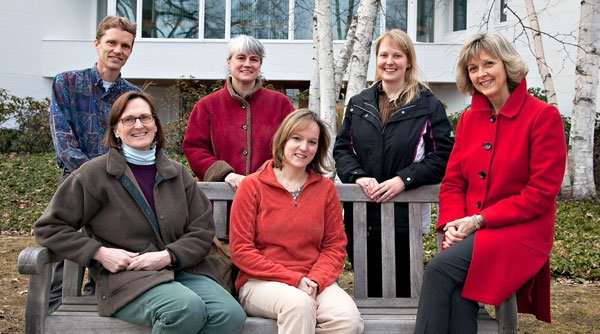Dartmouth has been awarded $2.5 million from the National Science Foundation (NSF) to give Dartmouth graduate students opportunities to work with middle school teachers in the Upper Valley region of Vermont and New Hampshire. The program promotes science, technology, engineering, and math (STEM) among middle school students.
The five-year award is part of NSF’s Graduate STEM Fellows in K-12 Education Program, also referred to as GK-12.

“This program recognizes that, in addition to being researchers, STEM graduate students must be able to communicate science to a variety of audiences,” says Carl Renshaw, the principle investigator on the project and a professor of earth sciences. “As graduate students bring their research into classrooms, they learn to explain science to people of all ages and share their enthusiasm.”
Renshaw joined several colleagues in partnering with Judy Filkins, the K-8 math and science curriculum coordinator with the Lebanon (N.H.) School District, to develop this program. Dartmouth collaborators include Nancy Serrell, Dartmouth’s director of academic outreach; Cindy Tobery, the associate director at the Dartmouth Center for the Advancement of Learning (DCAL); Janet Zullo, an instructor with Dartmouth’s Education Department; and Vicki May, a lecturer at Dartmouth’s Thayer School of Engineering and former associate director of DCAL.The project offers benefits for all participants, says Filkins. “This is a terrific entry point for Upper Valley students and teachers to interact with Dartmouth researchers and faculty. Dartmouth resources will be available to school participants, but just as important is the access Dartmouth participants will have to the real-world learning that goes on in middle school classrooms. This is a win-win for all.”
The project has particular appeal for graduate students at Dartmouth, says Serrell. “Almost all of our undergraduate classes are taught by faculty, so graduate students have limited opportunities to gain teaching experience, something many of them want and will need in their future careers.” The program will provide support and training to help the graduate students be effective middle-school teachers and mentors.
Julie Skinner, a graduate student in Dartmouth’s physics and astronomy department, agrees. “As a graduate student, I’ve participated in other Dartmouth science outreach with school children and found it really does give you a fresh perspective on your research—and the opportunity to get hands-on classroom experience is invaluable.”
The program will emphasize the creative aspect of science, says Serrell. “One problem with getting kids interested in science is that by middle school, they begin seeing it as a boring collection of facts to be memorized. They don’t hear that creativity is just as important to success in science as, say, getting good grades in math. And they don’t actually meet scientists or see scientists they can relate to on television or in the movies.”
Graduate students will be matched with middle school teachers late this summer, and classroom visits will begin in the fall. School districts in New Hampshire and Vermont, including Claremont (N.H.), Mascoma (N.H.), Thetford (Vt.), Dresden (Vt. and N.H.), and Woodstock (Vt.) will participate in the program.

